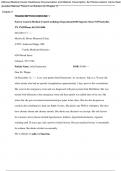(Hillcrest Medical Center Healthcare Documentation and Medical Transcription, 8e Patricia Ireland, Carrie Stein)
(Solution Manual, There is no Solution for Chapter 1)
Chapter 2
TRANSCRIPTION EXERCISE 1
Forrest General Medical CenterCardiology Department1038 Superior Street NWNashville,
TN 37189Phone 615.555.5000
December 17, ----
Merwin B. Moore Memorial Clinic
ATTN: Anderson Phipps, MD
Family Medicine/Geriatrics
6249 Broad Street
Lebanon, TN 37106
Patient Name: Julia Paternoster DOB: 03/08/----
Dear Dr. Phipps:
On December 12, ----, I saw your patient Julia Paternoster. As you know, Julia is a 70-year-old
white female who had an episode of palpitations approximately 5 days prior to this consultation.
She went to the emergency room and was diagnosed with paroxysmal atrial fibrillation. She was
treated with diltiazem in the emergency room and then aspirin was added later on by you. She
states that she gets occasional nonexertional gas pains in her chest. She also has dyspnea on
exertion after climbing less than one flight of stairs. She denies any PND or orthopnea. She does
have chronic edema and chronic anemia. She denies any dizziness or syncope. Her risk factors
for coronary artery disease include hypertension, diabetes, hypercholesterolemia, cigarette
smoking until 20 years ago, and a positive family history. Her past medical history is remarkable
for asthma. She drinks alcohol occasionally.
She is allergic to sulfa and Bactrim.
,Anderson Phipps, MD
December 17, ----
Patient Name: Julia Paternoster
Page 2
Patient’s medications at present include Fosamax 70 mg p.o. weekly, Advair 50/250 one puff
b.i.d., Actos 15 mg p.o. daily, Zaroxolyn 2.5 mg p.o. daily, and aspirin 325 mg p.o. daily.
On physical examination in my office, patient had a blood pressure of 152/70 and a regular pulse
of 64. She had 1 to 2 cm of jugular venous distention at 90 degrees. She had a right carotid bruit.
She had a few scattered rhonchi and wheezes bilaterally. She had normal 1st and 2nd heart
sounds. There were no murmurs and no gallops. Her abdomen was benign, with active bowel
sounds; there was no organomegaly. There was 11 edema bilaterally.
Her electrocardiogram demonstrated a sinus bradycardia with an incomplete right bundle branch
block.
Because of this episode of probable paroxysmal atrial fibrillation and her shortness of breath, I
have scheduled Julia for an echocardiogram and a Holter monitor. At this point I have not
changed any medications, but it does appear that she needs better control of her blood pressure.
In addition, because of the right carotid bruit, she will need a carotid ultrasound, which I will
schedule several weeks down the line. Once I have further evaluated her paroxysmal atrial
fibrillation, she will also require a stress echocardiogram to rule out ischemia as a cause of her
dyspnea on exertion. She has multiple risk factors and would be at high risk for coronary artery
disease.
I will send you the results of these tests when they are completed.
Thank you very much for allowing me to participate in the care of your patient.
,Anderson Phipps, MD
December 17, ----
Patient Name: Julia Paternoster
Page 3
Yours truly,
Jennifer Hutto, MD, Cardiology
JH:xx
Enc: Copies of CBC and CMP laboratory reports
Footnote: First paragraph, last line: “She drinks occasional alcohol” was dictated; students can
reword this to read “She drinks alcohol occasionally.” Discuss style differences.
, TRANSCRIPTION EXERCISE 2
Forrest General Medical Center
1038 Superior Street NW
Nashville, TN 37189
Phone 615.555.5000
HISTORY AND PHYSICAL EXAMINATION
Patient Name: KRAMER, Mary PCP: Anderson Phipps, MD
Date of Admission: May 13, ---- Sex/Age: F/80 DOB: Feb 1, ----
Admitting Physician: Toni Jackson, MD Patient ID: 000123
CHIEF COMPLAINT
Shortness of breath and palpitations.
HISTORY OF PRESENT ILLNESS
This is an 80-year-old black female with a history of CHF and atrial fibrillation who was in her
usual state of health until 3 weeks ago when she started to notice exertional dyspnea. She went to
see her cardiologist who increased her dose of Lasix. During the last week she has noticed
palpitations associated with exertional dyspnea, which has been getting worse, and also
orthopnea and paroxysmal nocturnal dyspnea. The patient denies any cough or chest pain. She
denies any abdominal pain, nausea, vomiting, or diarrhea. She denies any fever, chills, recent
travel, or recent immobilization. She denies any urinary symptoms. She usually has chronic
lower extremity edema, but that has disappeared with water pills. She presented to the
cardiologist’s office today and was found to be in atrial fibrillation with rapid ventricular
response and was sent to the hospital for direct admission.




